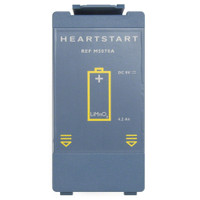Don't use third-party batteries in Philips AEDs
Posted by First Responder Systems on 8th May 2021
Facts to consider regarding batteries for your Philips HeartStart AED
Philips HeartStart batteries are manufactured with a high level of quality. Third-party (non-Philips) AED batteries may not be manufactured to the same level of quality. Before purchasing a third-party AED battery, consider the following:
Safety facts
- The high level of performance demanded of a Philips HeartStart AED battery pack requires every cell to have a balanced electrical capacity. Battery cells inside third-party battery packs could be mismatched resulting in dangerous electrical stress on the cell during use, possibly leading to fire, explosion, or the inability to perform a rescue.
- Battery cells inside Philips HeartStart battery packs are carefully aligned, connecting wires are well insulated, and silicone use is kept to a minimum. Battery cells inside third-party battery packs could have misaligned cells that could cause intermittent connectivity, poor insulation that could pose a fire hazard, or excessive silicone that could block venting and increase explosive risk
- Philips AED batteries contain high-quality welding and a meticulous arrangement of components inside an enclosure that is ultrasonically welded together, all to ensure that the battery meets vibration, drop, moisture, and thermal requirements. Third-party AED batteries may not be assembled in a way that ensures performance in the wet, rugged environments that Philips HeartStart users often work. Without proper welding, for example, water could pass through the third-party battery and into the AED itself, thereby compromising the integrity of the AED.
Warranty facts
Using a third-party battery inside a Philips HeartStart AED at any time during the service life of the AED will void the Philips warranty because a third-party battery may compromise the integrity of your Philips AED. Furthermore, if any patient use occurs with a Philips HeartStart AED that has ever been used with a third-party battery, or while using a third-party battery, Philips will not be responsible for the AED’s performance.
Shipping facts
The United States Department of Transportation (US DOT) prohibits the shipment of AED batteries by persons untrained in “Dangerous Goods” shipping methods, which include special requirements for labeling boxes that batteries are shipped in. The US DOT can levy fines against both the shipper and receiver of improperly shipped AED batteries. It doesn’t matter if the AED battery is depleted or not; the US DOT requires special handling and special labeling. If you are going to purchase third party batteries that require you to ship AED batteries, you should familiarize yourself with these rules and regulations.

